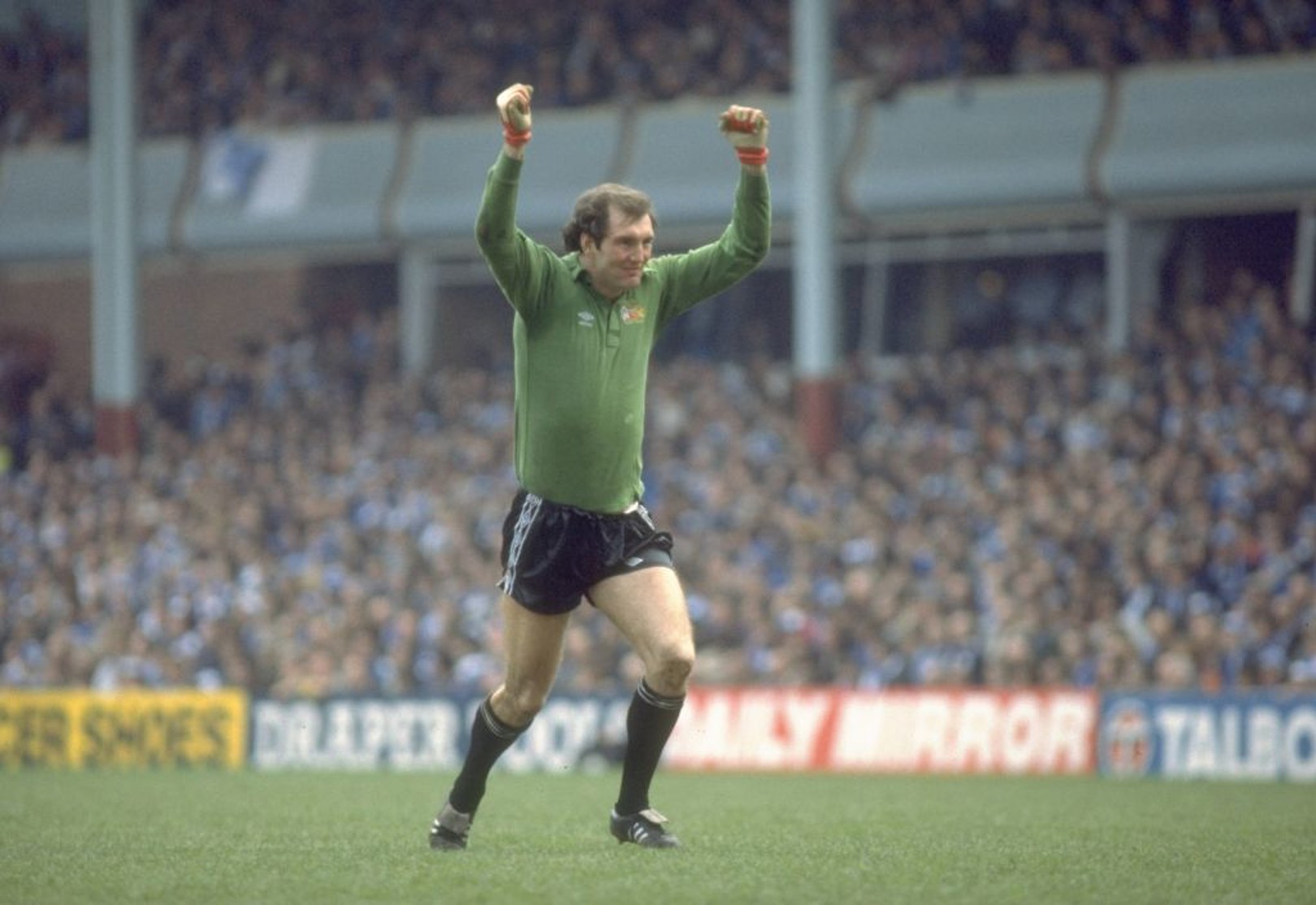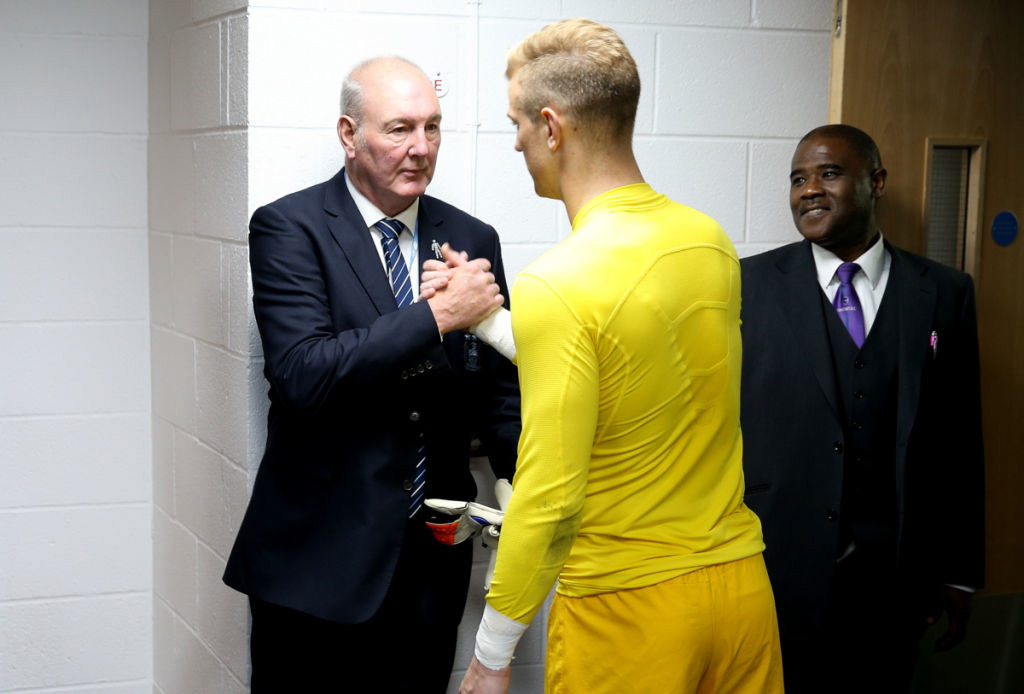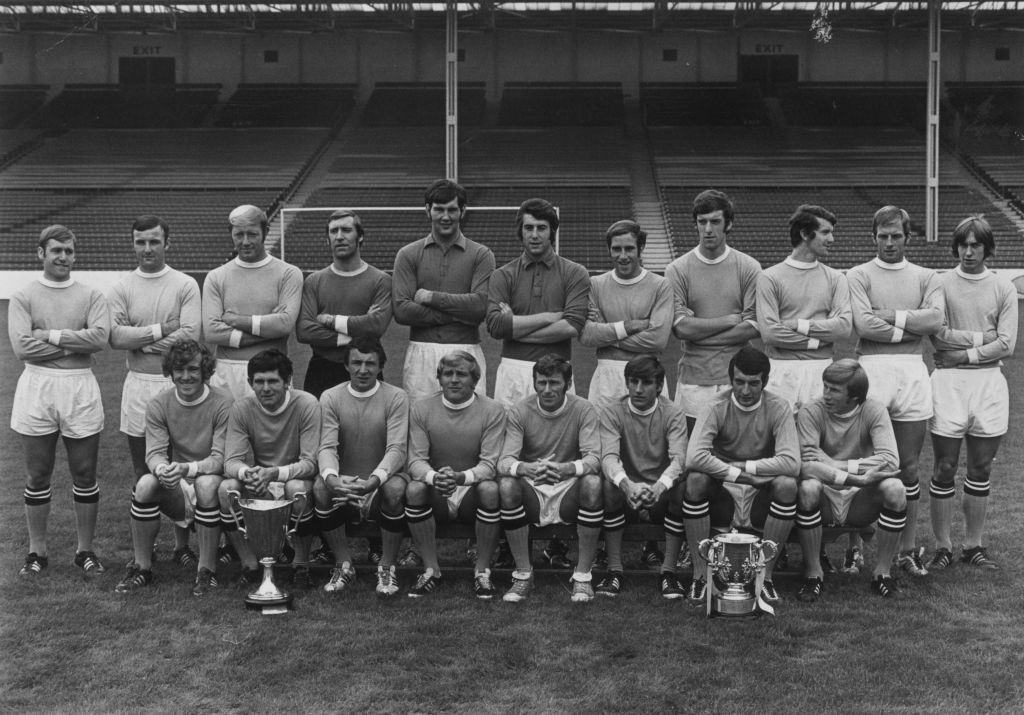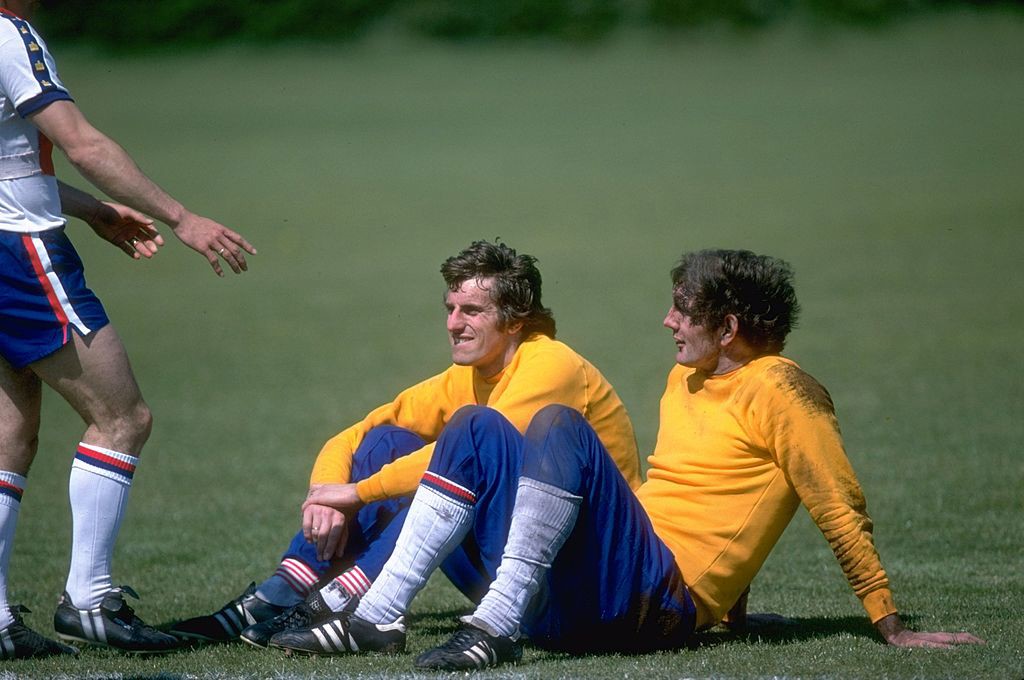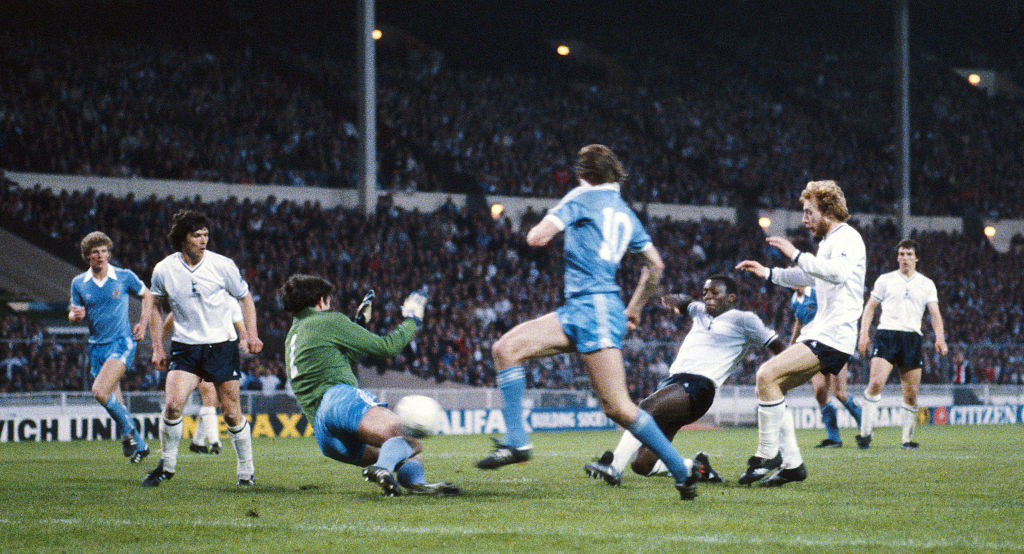A giant of a man, a veritable rock of ages for Manchester City.
That’s the best way to surmise the extraordinary City career of Joe Corrigan.
One of a select band of players to have represented the Club over the course of three decades, from 1967 through to 1983, the English goalkeeper was a reassuring presence at the back of our defence for a succession of City sides.
From humble beginnings growing up in a Sale council house to proudly representing his country at Wembley and abroad, the man universally known throughout the game as Big Joe saw it all during almost 18 eventful years at our former Maine Road home.
Slaloming between Wembley Cup glory and magical European nights to managerial merry go-rounds and boardroom upheavals, it proved a real rollercoaster ride of emotions.
Yet throughout all the highs and lows, the triumphs and the turbulence, Corrigan’s talent, bravery and unswerving love for the Club shone through.
With just over 600 City games under his belt, only Alan Oakes played more times for the Club though a tally of two League Cup winners’ medals, a European Cup Winners’ Cup medal and nine England caps only scratches at the surface of Corrigan’s impact and enduring legacy.
Big Joe’s expertise and insight was also utilised to the full at the end of his playing days, with Corrigan going on to establish a formidable coaching pedigree thanks to his work with City, Liverpool, West Brom and Hull as well as his role with England at Under 20, Under 19s and Under 17s level.
Even in retirement, his passion for the game in general and City, in particular, remains as strong as ever, with Big Joe kept busy both as an official Club Ambassador and City goalkeeping scout.
But his story is the stuff of legend.
“When I look back at my City career, it was incredible,” reflects Big Joe.
“It was a humbling experience to start with. I was a working-class lad, my Mum and Dad were working class – my Dad was in the Army in Korea - and I had fought hard to get into Sale Boys’ Grammar School.
“So when you get a chance to join a Club like City with such a massive stature, you can’t describe it. I suppose it was a bit like ‘local boy does good.’
“It was just amazing that I had come from a council house in Sale Moor, playing on the local parks to playing for City at Wembley and representing your country, it’s just an amazing scenario.
“I was so lucky to have such amazing players in front of me and to have such excellent goalkeepers like Harry Dowd and Ken Mulhearn at the Club who helped me so much.”
Having made his first team debut in a League Cup tie in 1967, Corrigan’s league debut followed in 1969 and after being installed a first choice keeper at the start of the 1969/70 campaign, the then 18-year-old went on to enjoy a meteoric campaign.
By the end of it, he was part of the majestic City side assembled by Joe Mercer and Malcolm Allison which lifted the League Cup and European Cup Winners Cup.
Not that everyone saw it that way, as Corrigan recalls.
“A lot of people say: ‘You didn’t have a good start to your career at City,’” Big Joe chuckles.
“And I’m thinking ‘Well, hang on. In my first season, I won an England Under-23 cap, we won the League Cup and we won the European Cup Winners Cup, so it can’t have been that bad!
“It was just wonderful to be part of such an incredible team with so many great players. I really did have to pinch myself at times.”
However, Corrigan was soon to experience the fickle nature of footballing fate was soon to play its hand as both City’s and his own fortunes suffered a slow but steady downturn.
“Looking back, after we reached the semi-final of the European Cup Winners’ Cup in 1971 and got beat by Chelsea, I think that was the start of the disintegration of that great, great team and the start of a downward trend,” Corrigan admits.
“There were so many changes going on, not just on the field but off it too. Joe Mercer left and Malcolm took over as manager but didn’t do very well.
“And then we had so many different managers in a short space of time just after all that success.
“The downturn in my career happened around that time and I’m not making excuses as a lot of it was my fault as I wasn’t playing that well and I spent a fair bit of time out of the first team.
“But a lot of it coincided with the disintegration of that great team. We had so many managers in just a few years. Joe, Malcolm, then Johnny Hart, then Ron Saunders and then Tony Book.
“However, when Tony took over in the mid-1970s that’s when we started to really do well again and it was the second era of success for us and I thought the team was nearly as good as the late 60s team.”
Indeed it was. The swashbuckling side assembled by Book featuring the likes of Dennis Tueart, Joe Royle, Asa Hartford and a youthful Peter Barnes, caught the imagination of fans up and down the country.
With City back in business, Corrigan and Co conquered Wembley in February 1976 as we won the League Cup against Newcastle and the following season, City finished first division runners-up, finishing just a point behind champions Liverpool.
“That was a really good side and one that was a pleasure to be part of,” Joe recalls. “The Watsons, Kidds, Hartford’s, Tueart, Barnes, Oakes’s, there were some great players in that squad.
“It if hadn’t had been for the injury to Colin Bell in late 1975 I think we would have gone on to win a lot more. You can never replace a special player like Colin.
“We won the League Cup in 1976 which was a great achievement and then I thought we were very, very unlucky not to win the league title in the 1976/77 season.
“And I have no doubt that if Belly had not got injured, we would have won much more and in today’s format we would have been in the European Cup for four years running.
“But that’s football.”
By this stage, Corrigan’s consistency and quality was also catching the eye of the England selectors and his lifelong dream of representing the Three Lions was to be realised in the most glamorous and unexpected of locations.
“I was getting ready to go to Japan and Korea on a close season tour with City in the summer of 1976. But we’d heard that Tony’s assistant Ian MacFarlane was leaving, and that Bill Taylor was coming in to replace him,” Joe reveals.
“Bill was also Don Revie’s first team coach with England, and then I got called up into the England squad for the Bicentennial Cup tournament staged in America that summer as Peter Shilton decided he didn’t want to play and I won my debut cap in New York’s Yankee Stadium against Italy.
“It always sticks in my memory.
“We were 2-0 down at half time and I suddenly got the call to come on. I had to run across the New York Yankees pitch from one end to where the grass was in order to get changed and then come back out and the goal was in the baseball diamond.
“It was an unbelievable moment and what made it even better was that we came back to win 3-2 - and that was against a great Italy team.
“People say I should have won more caps, but my view is that if I had won one, I would have been over the moon. I was very fortunate.
“I got nine in total and you can’t get any higher honours than playing for your country. Plus there were so many great ‘keepers around then – not just Peter and Ray Clemence, but the two Phil Parkes, Jimmy Rimmer, it was such an amazing era of English keepers.
“We were classed the best in the world, and they were.”
Back at club level, the fluctuating fortunes that mirrored City’s time in the 70s and 80s was set in motion again when Malcolm Allison returned once more to take charge in 1979.
It was to prove an unsuccessful reunion for both parties and presided yet another turbulent era in the Club’s history, with John Bond succeeding Big Mal just over a year later.
The managerial changes were also mirrored with myriad changes in the make-up of the City squad with a conveyor belt of players joining and leaving.
But for Corrigan the one constant, reassuring presence in that time was the unswerving loyalty and support of the City fans.
“There were a lot of changes in the playing staff, but the biggest ructions were in the board room with chopping and changing and there was no stability in that part of the club during that era,” Joe ruefully recalls.
“The uncertainty seemed to filter through to the players but, typical City, the fans kept loyal through all the bad times.
“The teams before had set such high standards and once that standard drops, it feeds into other things and the press get onto you, but the City supporters were class throughout.”
Despite those trials and tribulations, there was so nearly a glorious postscript towards the end of Joe’s City days, with the big keeper helping pilot City to the 1981 Centenary FA Cup final against Tottenham.
However, fate on this occasion conspired against us.
With Corrigan being named man of the match, only a freak Tommy Hutchison own goal deprived City victory on the Saturday, the final finishing 1-1 after extra time.
Bond’s men then led 2-1 in the subsequent replay five days later only for Spurs to score twice in the last 20 minutes to claim the silverware.
“I think we lost on the Saturday because if we had carried on playing, we would have beaten them that day,” Joe reflects.
“We didn’t deserve it and it was such a freak goal that they scored to equalise. We may have lost the replay, but I still have my two trophies for being voted man of the match in both games.
“However, what did amaze me back then was that the FA could go and agree at the start of the season they would have a replay at Wembley on the Thursday if needed - and then later agree to stage England v Brazil on the Tuesday.
“I had been named in the England squad and I would have played against Brazil but then, with us drawing on the Saturday, I obviously had to withdraw.”
In reflecting on his huge contribution to the City cause, the humility and generosity of spirit that were the hallmark of Corrigan the player are still evident today.
“I was just doing my job. From the first day I can remember I always wanted to be a goalkeeper,” Big Joe surmises.
“I had some great teachers and played against and with so many true legends of the game, and I don’t use that word lightly.
“If anyone asks me if I would have liked to play today, I say ‘No, I had a fabulous career, I met some great people and a few villains! But I would not change my career for all of the tea in China.’”

